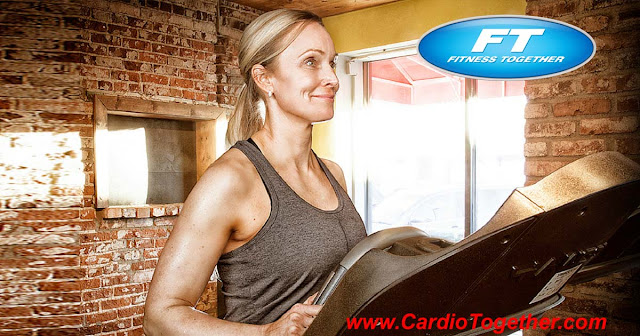Trainer Tuesdays
Welcome back to the weekly edition on Trainer Tuesdays. Make sure to check in at our blog every Tuesday evening to learn the expertise of our great staff. Aside from being fantastic exercise coaches, they are also extremely knowledgeable in many aspects of health and fitness; so, it's time that you get to know them a little better! Each week, we will post a frequently asked, or sometimes just a fun fitness related question followed by the answers of each of the trainers at Fitness Together Brecksville.
Should I Do Cardio to Lose Weight or to Improve my Heart and Lung Health?
Michael Roberto: While
cardio can aid in weight loss, I personally like to do it to strengthen my
heart and lungs. During aerobic exercise (walking, jogging, etc.), your
working muscles need more blood. So the heart works harder to do so and
gets stronger and increases the volume of blood it can deliver.
Meanwhile, your lungs become more efficient in delivering to the blood and
removing the carbon dioxide waste. As an added bonus, your diaphragm, the
muscle that supports your lungs, gets stronger as well.
Kelly Bailey: If you're trying to lose weight,
cardio should be kept to a minimum. Your main focus should be on nutrition
and lifting weights. Any cardio should consist of shorter bouts of
"burst" training. Burst training, also called interval training, is
performed by doing a very short and intense work interval, followed by a
recovery period that is usually about twice the length of the work interval.
You cycle through the work/rest intervals 4 to 6 times. A proper interval
workout should take no more than 25 minutes to complete.
For cardiovascular health, the
American Heart Association recommends at least 30 minutes of moderate-intensity
activity, five days per week. For those of you that dislike running or heavy
sweat sessions, have no fear! The best moderate-intensity cardio you can do is
brisk walking!
Adam Teplitz: There
are endless benefits to cardio exercise. One of the most important ones is the improved health of your heart and your
lungs. During aerobic exercise (cardio), your working muscles demand more
oxygen, and this prompts the heart to work harder, get stronger, and increase
the volume of blood it can deliver to muscles. Your lungs, meanwhile, become
more efficient in delivering oxygen to the blood and removing the carbon
dioxide waste.
The other main benefit to cardio is weight loss. During cardio exercise, your body is burning calories (mainly from carbohydrates and fats) to fuel the exercise.
Cardio should always be included with a strength training routine to maximize weight loss.
Everyone is unique and will benefit from their own individualized cardio program.
 |
| Personal Trainers Lisa & Amanda Supporting Heart Health Month |
Amanda Ricci: The answer to the above question is both. Cardio should be done not only to improve the
health of your heart and lungs but also to lose weight. By doing cardio, your increasing the amount
of work of the heart and lungs. In order
to move the heart must pump blood not only to the lungs but also to the rest of
the muscles in the body so that they are able to contract, and thus your body
is able to move. The more intense the
exercise the harder the heart must work.
Once the heart builds endurance, it become more efficient and doesn’t
have to pump as hard to deliver blood to the muscles in the body. Therefore, it
becomes stronger. One way to measure of
your hearts endurance is through your heart rate or pulse in beats per minute.
An example of this would be a professional endurance athlete, who has a pulse
of 40 beats per minute, compared to someone who is active on average may be
anywhere from 60-100 beats per minute.
In order for your body to move it needs energy. It receives this energy through the calories
that we take in from eating food. It
uses this energy with all the necessary activities needed for survival such as:
sleeping, eating, breathing, moving and walking, etc. If you take in more calories than what you
burn then you will gain weight. If you
take in less than you will lose weight. If you do not eat enough calories than
your body could go into starvation mode and hold onto body fat because it does
not know when it is going to eat again. The calories that you burn by performing
daily activities are not enough to get you into the fat burning zone. By doing
cardio and getting your heart rate into your target zone you are adding to your
calorie deficit, which will assist you in losing weight. Burning calories and eating healthy will
create a negative energy balance in the body, which will assist you in losing
weight. This is why it is necessary to
do cardio for both losing weight and training your heart and lungs.
Steven Madden: I personally would
focus on heart and lung health when doing cardio more that I would weight loss.
The truth is that steady state cardio is one of the best ways to improve your
cardiovascular system. Having a stronger heart and a larger lung capacity can be
beneficial in all areas of life, not just what the scale says. Cardiovascular
health can also be a better goal to focus on, as you can directly feel results.
When you don't get winded going up the stairs, that can be a better
accomplishment that dropping a few pounds. Plus, when you work on your
cardiovascular system, you'll drop weight anyway, so why worry about it?
Lisa Clark: Cardiovascular exercise
is both a great way to strengthen the heart and also aids in weight loss. By training
the heart to pump more efficiently during cardio training, you in turn are
boosting your metabolism, burning more calories and helping with weight loss.
In addition it helps reduce stress, improves sleep and increases energy!
© 2016 Fitness
Together, Inc. All Rights Reserved. Powered by Fusionbox.
About | Contact | Franchise | Suppliers | History | Leadership | NutritionTogether |Sitemap | PrivacyPolicy | TermsofUse | Facebook | YouTube | Twitter | Linkedin | Yelp


No comments:
Post a Comment